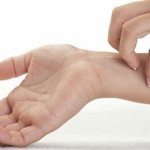Facts of Herbal Remedies for Eczema (Atopic Dermatitis)
Nowadays, the tag ‘herbal’ is increasing popular. It is thought can help improve and relieve certain health problems with least side effects and even may be cheaper than conventional treatments. Unfortunately, not all of them are supported with adequate scientific evidence. How about eczema, particularly for atopic dermatitis? What are herbal remedies that really work for this kind of chronic skin disorder? Here are some truths and facts you need to know!
It’s clear that tea contains some antioxidants and other essential substances that can help provide some health advantages. And therefore, some people believe that drinking tea can help improve eczema – is this opinion a fact or only myth?
There are some types of tea such as oolong, black, and green tea – but which one that can help? The answer may be unclear, but some studies found that tea (green tea, oolong, or even black tea) may help improve, relieve, or prevent some allergic reactions.
A study in Japan found that oolong tea may help improve eczema. In this study, participants with atopic dermatitis (we know it as the most common type of eczema) followed treatment plan designed with oolong tea.
After about 1-2 weeks, the positive effect of the improvement was noticed. In general, about 63 percent of all participants noticed improvement after about 30 days.
However, tea contains some caffeine. And we know well that caffeine can cause a dramatic increase in blood pressure. So if you also have hypertension (high blood pressure problem), it’s recommended to consult first with your doctor!
Furthermore, excessive caffeine can increase sleeplessness, restlessness, and anxiety. And if you have eczema, these feelings can be counterproductive in helping improve the problem. So in general, it’s better to keep drinking tea moderately.
How about with chamomile? Nowadays, it is used worldwide to help treat and improve some health problems, including for atopic dermatitis.
But in fact, there is currently no adequate scientific evidence to confirm its effectiveness in human and its utilization as essential oil or tea. Even it may be counterproductive, in some cases it causes an allergic reaction.
Limited studies found that moderately drinking oolong tea may help improve and relive atopic dermatitis, particularly when it is used along with the treatment plan prescribed by doctor /dermatologist. And the use of chamomile is still debatable – even it can be life threatening in a few cases.
Blends of Chinese herbal medicines have proven effective in helping to control atopic dermatitis. But unfortunately, it also can be toxic for some sufferers, particularly if you use them improperly.
According to a long-term study, some participants who took blends of Chinese herbs experienced abnormal liver function. Even a report found 21 cases of using Chinese herbal medicines to relieve skin problems ended toxicity in London.
 Another bad news, the use of Chinese herbs for eczema may also be potential to cause a kidney failure. They also may increase the risk of heart disease.
Another bad news, the use of Chinese herbs for eczema may also be potential to cause a kidney failure. They also may increase the risk of heart disease.
In addition, the use of applying an herbal remedy to the affected skin is also not free of side effects.
A chemical evaluation found that some over-the-counter herbal lotions /creams offered for eczema treatment contain potent corticosteroids. This may be the reason of why the use of them can provide a significant improvement in helping to treat eczema in some cases.
Corticosteroids can be used to treat eczema or other skin conditions. But they should only be used with prescription. The use of potent topical corticosteroids in long term may lead to dilated blood vessels, thinning skin, excess body hair, stretch marks, and even infection.
For these reasons, talk first with a qualified herbalist or your doctor before taking any herbs!
While the use of some Chinese herbs may help improve and relieve eczema in some cases, currently these options are not officially regulated. Moreover, there are possible side effects that can be counterproductive.
Probiotics are often considered as super-agent that can help improve the health of our digestive system and also provide other health advantages. How about its effectiveness for eczema? Does it really help?
A few researches suggest that taking probiotics through dietary supplements (this option is taken along with the topical therapy and treatment plan prescribed by doctor /dermatologist) may help improve atopic dermatitis.



